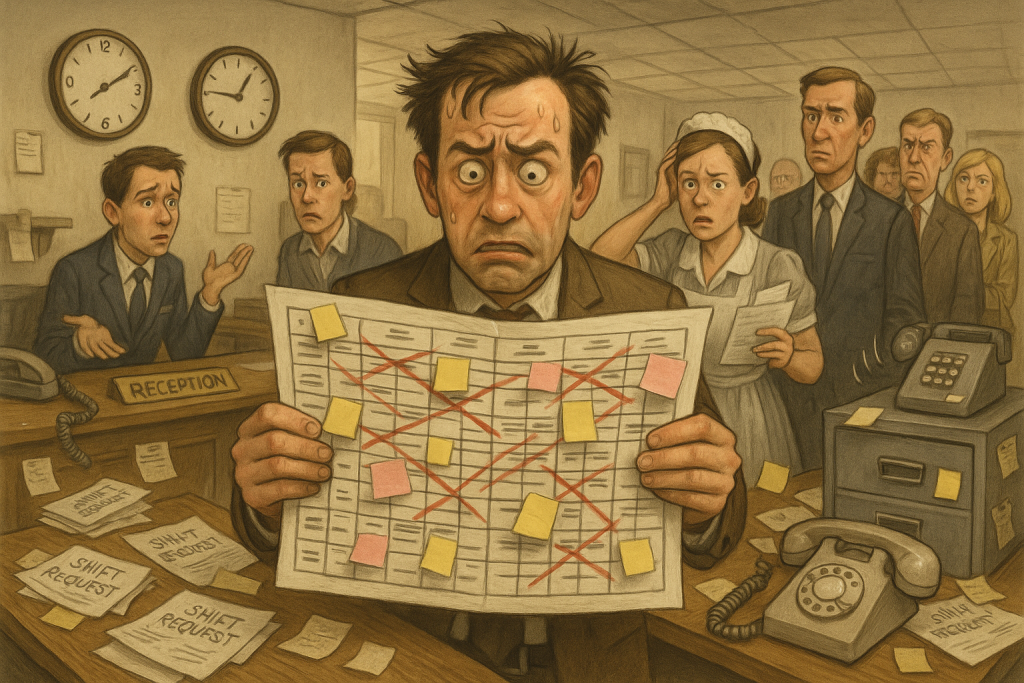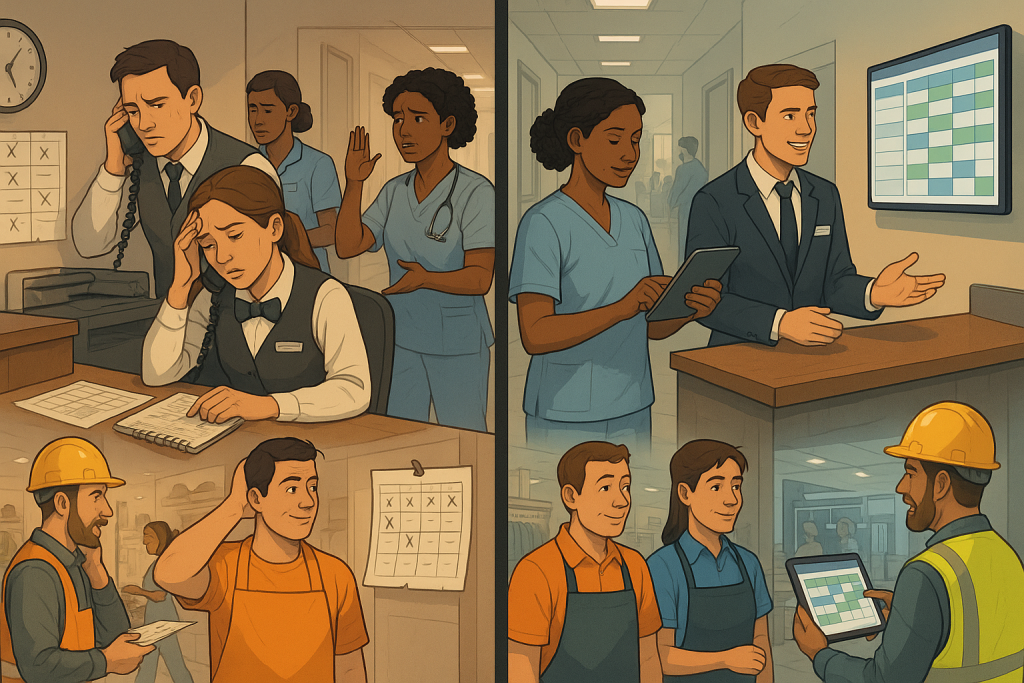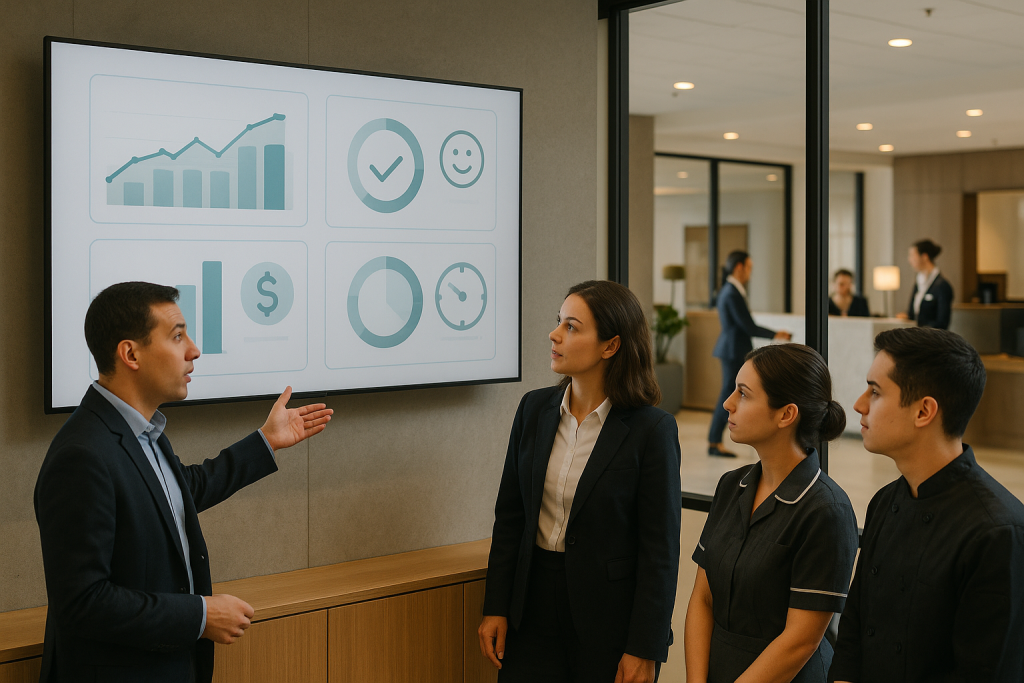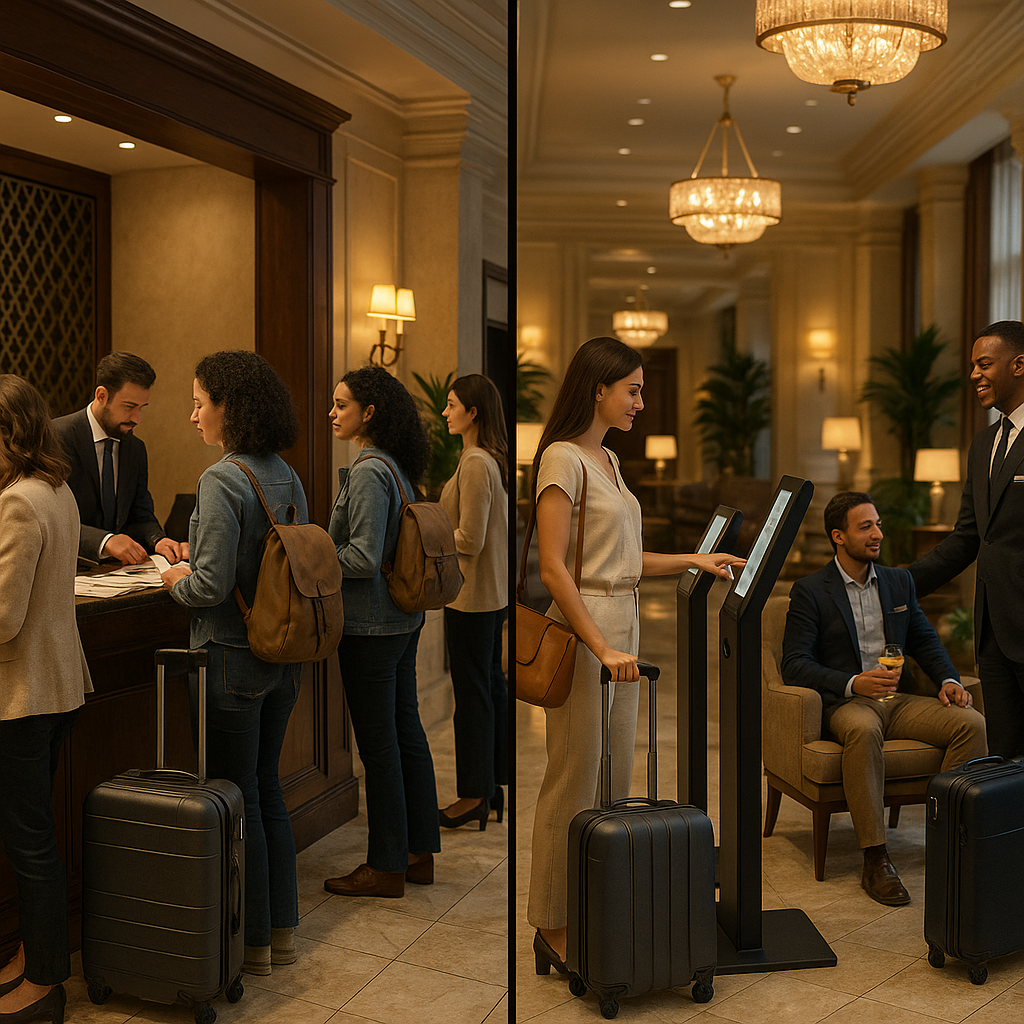After nearly four decades of helping businesses optimize their operations, I’ve discovered that hospitality has one of the most complex scheduling challenges of any industry. You’re not just managing rooms or tables—you’re orchestrating an intricate dance of staff schedules, customer reservations, resource allocation, and service delivery, all while maintaining the seamless experience your guests expect.
The $127,000 Annual Cost of Scheduling Chaos
Let me paint a picture that every hospitality manager will recognize. It’s Friday afternoon at a mid-sized hotel with 150 rooms, a restaurant, and conference facilities. The weekend is approaching—traditionally the busiest time—and chaos is unfolding:
- The front desk discovers they’ve double-booked three rooms for Saturday night
- The restaurant has 40 reservations but only two servers scheduled due to a communication breakdown
- A wedding party of 200 arrives to find their reserved conference room is being used for a corporate event
- Housekeeping is short-staffed because of last-minute call-outs that weren’t covered
- The kitchen is overwhelmed because nobody coordinated catering needs with restaurant reservations
This scenario, which our research shows occurs in some form at 73% of hospitality businesses monthly, doesn’t just create immediate crisis management—it creates lasting financial damage:
- Guest dissatisfaction leading to negative reviews and lost repeat business
- Emergency staffing costs and overtime expenses
- Comped rooms and meals to appease frustrated customers
- Management time diverted from revenue-generating activities
- Staff burnout from constantly fighting scheduling fires
Our analysis of mid-sized hospitality businesses shows these scheduling failures cost an average of $127,000 annually in direct costs and lost revenue opportunities.
Why Traditional Hospitality Scheduling Fails

Most hospitality businesses approach scheduling like they’re managing a simple retail operation. They use basic spreadsheets, generic scheduling software, or disparate systems that don’t communicate with each other. But hospitality scheduling is exponentially more complex because of interdependent resource management.
The Multi-Resource Complexity Problem
Unlike other industries where you’re scheduling one resource at a time, hospitality requires simultaneous coordination of:
- Physical spaces (rooms, tables, meeting rooms, event venues)
- Human resources (front desk, housekeeping, kitchen staff, servers, management)
- Equipment and supplies (linens, AV equipment, kitchen equipment, cleaning supplies)
- Time-sensitive services (check-ins, meal service, housekeeping turnovers, event setup)
Traditional scheduling systems handle these as separate problems, but in reality, they’re completely interdependent. A room booking affects housekeeping schedules, which affects supply needs, which affects when the room can be cleaned for the next guest.
The Real-Time Change Challenge
Hospitality operates in constant flux. Guest plans change, staff call in sick, events get modified, and weather affects occupancy patterns. Traditional scheduling systems can’t adapt in real-time, creating cascading problems throughout the operation.
The Customer Experience Impact
Perhaps most critically, scheduling failures in hospitality directly impact customer experience in ways that other industries don’t face. A scheduling error in manufacturing might delay a shipment, but a scheduling error in hospitality ruins someone’s vacation, business trip, or special celebration.
How Automated Scheduling Transforms Hospitality Operations
Modern automated scheduling systems for hospitality don’t just prevent double bookings—they create intelligent resource optimization that improves both operational efficiency and guest satisfaction.
Intelligent Resource Coordination
Advanced scheduling AI understands the relationships between different resources and automatically coordinates them:
- When a room is booked, the system automatically schedules housekeeping turnover time
- Restaurant reservations trigger kitchen prep scheduling and server assignments
- Event bookings automatically coordinate room setup, AV equipment, and catering staff
- Staff schedules adjust automatically based on predicted occupancy and service needs
Predictive Demand Management
AI-powered systems analyze historical patterns, local events, weather forecasts, and booking trends to predict demand and optimize scheduling:
- Staff levels automatically adjust based on predicted occupancy
- Resource allocation optimizes based on expected service needs
- Pricing and availability adjust dynamically to maximize revenue
- Supply ordering integrates with predicted demand patterns
Real-Time Adaptation and Problem Resolution
When changes occur, automated systems immediately recalculate optimal resource allocation:
- Staff call-outs trigger automatic coverage requests and schedule adjustments
- Guest changes instantly update all affected resource schedules
- Equipment failures automatically reschedule affected services
- Weather or event changes trigger proactive schedule modifications
Case Study: Transforming a Resort’s Operations

Let me share a detailed case study that demonstrates the real-world impact of automated scheduling in hospitality:
The Property: A 200-room resort with three restaurants, conference facilities, spa services, and recreational activities. Annual revenue of $28 million with historically strong occupancy but persistent operational challenges and guest satisfaction issues.
The Challenges:
- Double bookings occurred 2-3 times weekly, requiring expensive guest relocations
- Staff scheduling required 15 hours weekly of management time
- Housekeeping turnover delays caused 12% of check-ins to be delayed
- Restaurant service suffered due to poor staff-to-guest ratios
- Conference room scheduling conflicts created customer service nightmares
- Seasonal staffing changes were chaotic and inefficient
The Automated Solution:
- Integrated property management system with AI scheduling
- Real-time staff scheduling based on occupancy predictions
- Automated housekeeping coordination with front desk operations
- Dynamic restaurant staffing based on reservation patterns
- Intelligent conference room and event space management
- Predictive maintenance scheduling for equipment and facilities
Results After 12 Months:
- Double bookings eliminated completely (0 incidents in 12 months)
- Management time for scheduling reduced from 15 hours to 2 hours weekly
- Check-in delays reduced by 89%
- Restaurant guest satisfaction scores improved by 34%
- Conference booking conflicts eliminated
- Staff overtime costs reduced by 42%
- Guest satisfaction scores increased from 3.2 to 4.6 (out of 5)
Financial Impact:
- Eliminated $85,000 annual cost of guest relocations and compensations
- Reduced management labor costs by $31,000 annually
- Improved operational efficiency increased revenue by 8% ($2.24 million)
- Reduced staff turnover saved $67,000 in recruiting and training costs
- Higher guest satisfaction led to 23% increase in repeat bookings
Handle Guest Communications Flawlessly While You Perfect Your Scheduling
Before implementing comprehensive scheduling automation, let’s address the communication chaos that often accompanies scheduling problems. When guests call with questions about reservations, room changes, or special requests, how quickly can your team respond professionally?
Get Your Custom AI Phone Agent for Hospitality – Built FREE
Picture this: A guest calls at 11 PM asking about their breakfast reservation timing, spa appointment availability, or late checkout options. Instead of voicemail, they reach your custom AI agent that can:
🏨 Hospitality-Specific AI Capabilities:
✓ Reservation Management – Check availability and handle booking modifications
✓ Guest Services – Answer questions about amenities, dining, and local attractions
✓ Concierge Functions – Provide recommendations and assistance 24/7
✓ Emergency Protocols – Route urgent situations to appropriate staff immediately
✓ Multi-Language Support – Serve international guests in their preferred language
✓ Integration Ready – Works with your existing reservation and scheduling systems
Your guests expect 5-star communication at all hours. Deliver it automatically.
👉 BUILD MY HOSPITALITY AI AGENT – FREE
No credit card required. Hospitality-trained AI ready in under 24 hours.
Industry-Specific Scheduling Challenges and Solutions

Different hospitality sectors face unique scheduling challenges that automated systems can address:
Hotels and Resorts
Challenges: Complex housekeeping coordination, front desk coverage, maintenance scheduling, seasonal staff variations Solutions: AI that coordinates housekeeping with check-out/check-in patterns, predictive staffing based on booking patterns, automated maintenance scheduling during low-occupancy periods
Restaurants
Challenges: Server-to-table ratios, kitchen staffing for varying menu demands, special event coordination Solutions: Dynamic staffing based on reservation patterns and historical service times, kitchen scheduling that coordinates with dining room capacity, automated coordination between front-of-house and back-of-house operations
Event Venues
Challenges: Complex setup and breakdown scheduling, coordination of multiple simultaneous events, equipment and staff allocation Solutions: Automated timeline management for event setup and breakdown, intelligent resource allocation across multiple simultaneous events, predictive staffing based on event complexity
Spas and Wellness Centers
Challenges: Therapist scheduling with service duration variations, room turnover coordination, equipment and supply management Solutions: AI that optimizes therapist schedules for maximum utilization while maintaining service quality, automated room preparation scheduling, intelligent inventory management based on service bookings
Implementation Strategy for Hospitality Businesses
Successful automated scheduling implementation requires careful planning due to the mission-critical nature of hospitality operations:
Phase 1: Assessment and Planning (Weeks 1-2)
- Audit current scheduling processes and pain points
- Map resource interdependencies and coordination requirements
- Analyze historical data to identify patterns and opportunities
- Develop implementation timeline that minimizes operational disruption
Phase 2: Core System Implementation (Weeks 3-8)
- Install integrated scheduling platform
- Migrate existing reservation and booking data
- Configure resource coordination rules and constraints
- Train core staff on new system operations
Phase 3: Advanced Features and Integration (Weeks 6-10)
- Implement predictive demand forecasting
- Add real-time adaptation capabilities
- Integrate with existing property management systems
- Deploy mobile scheduling management for managers and staff
Phase 4: Optimization and Staff Training (Weeks 8-12)
- Fine-tune scheduling algorithms based on operational data
- Train all staff on new processes and capabilities
- Implement performance monitoring and reporting
- Establish ongoing optimization protocols
Key Performance Indicators for Hospitality Scheduling

Hospitality businesses should track these critical metrics to measure scheduling automation success:
Double Booking Incidents: Target complete elimination within 90 days of implementation.
Check-in Delay Rate: Measure percentage of guests experiencing delayed check-ins. Expect 70-80% reduction.
Staff Scheduling Time: Track management hours spent on scheduling activities. Typical reduction of 80-85%.
Guest Satisfaction Scores: Monitor overall satisfaction and specifically service-related satisfaction. Expect 25-40% improvement.
Staff Overtime Costs: Measure unplanned overtime expenses. Target 40-60% reduction through better scheduling.
Revenue per Available Room (RevPAR): Track overall revenue efficiency. Well-implemented scheduling should improve RevPAR by 8-15%.
Advanced Features Revolutionizing Hospitality Scheduling
Leading hospitality businesses are implementing cutting-edge automated scheduling features:
Predictive Guest Behavior Analysis: AI that predicts guest service needs based on booking patterns, guest history, and demographic data, enabling proactive staff scheduling.
Dynamic Pricing Integration: Scheduling systems that automatically adjust pricing based on resource availability and demand predictions.
Weather and Event Integration: Systems that automatically adjust staffing and resource allocation based on weather forecasts and local event calendars.
Guest Communication Automation: Automated systems that keep guests informed of schedule changes, delays, or opportunities while protecting operational information.
Cross-Property Resource Sharing: For multi-property operators, AI that optimizes staff and resource allocation across multiple locations.
The Guest Experience Transformation

Beyond operational efficiency, automated scheduling fundamentally transforms the guest experience:
Seamless Service Delivery: When resources are properly coordinated, guests experience smooth, professional service without visible operational stress.
Proactive Problem Resolution: AI systems can predict and prevent problems before they affect guests, creating impressions of exceptional anticipation and care.
Personalized Service: Automated scheduling can coordinate personalized services based on guest preferences and history, creating memorable experiences.
Consistent Quality: By optimizing resource allocation, automated scheduling ensures consistent service quality regardless of occupancy levels or operational complexity.
The Competitive Advantage of Operational Excellence
In today’s competitive hospitality market, operational excellence is becoming a key differentiator:
Online Reputation Management: Smooth operations lead to better reviews, which directly impact booking rates and revenue.
Staff Retention: Well-organized operations reduce staff stress and turnover, improving service consistency and reducing training costs.
Capacity Optimization: Better scheduling allows properties to maximize capacity without compromising service quality.
Crisis Management: Automated systems provide resilience during unexpected situations, maintaining service levels that competitors can’t match.
Taking Action: Your Path to Scheduling Excellence

The hospitality industry is evolving rapidly, with guest expectations rising and operational complexity increasing. Properties that modernize their scheduling systems gain significant advantages in operational efficiency, guest satisfaction, and competitive positioning.
Your implementation roadmap:
- Assess Your Current State: Document your scheduling challenges and calculate their true cost
- Research Integration Requirements: Understand how automated scheduling will work with your existing systems
- Plan Your Implementation: Develop a phased approach that maintains service levels during transition
- Train Your Team: Ensure all staff understand the new capabilities and processes
- Monitor and Optimize: Use data to continuously improve your scheduling effectiveness
Remember, in hospitality, scheduling isn’t just about efficiency—it’s about creating the seamless experiences that turn first-time guests into loyal customers and brand advocates.
The properties that embrace automated scheduling now will set new standards for operational excellence, while those that delay will find themselves struggling to meet the expectations that their competitors are already exceeding.
Start Your Guest Experience Transformation Today
While you’re planning your comprehensive scheduling automation, you can immediately elevate your guest experience with a custom AI phone agent designed specifically for hospitality businesses.
🌟 Why Hospitality Businesses Love Our AI Phone Agents:
✓ Never Miss Guest Calls – 24/7 availability for reservations and inquiries
✓ Professional Guest Service – Consistent, friendly responses that reflect your brand
✓ Instant Reservation Help – Check availability and handle booking modifications
✓ Concierge Services – Provide local recommendations and amenity information
✓ Emergency Handling – Smart routing for urgent situations requiring immediate staff attention
✓ Guest Satisfaction Data – Track communication patterns to improve service
Real Hospitality Results:
- Boutique Hotel in Napa: Increased direct bookings by 34% with 24/7 AI availability
- Mountain Resort in Colorado: Reduced front desk call volume by 60%, allowing staff to focus on in-person guest service
- Urban Business Hotel: Achieved 4.8/5 guest satisfaction rating for phone service
Your guests call with questions at all hours – breakfast reservations at 6 AM, late checkout requests at midnight, emergency needs at 2 AM. Your AI agent handles them all professionally.
👉 GET MY FREE HOSPITALITY AI PHONE AGENT
Hospitality-trained AI that understands your guests’ needs. Ready in under 24 hours. No credit card required.
In hospitality, exceptional communication IS exceptional service. Start delivering both today.
